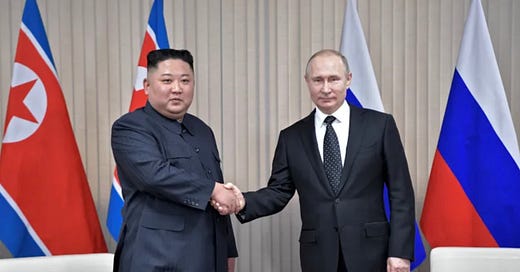Kim to meet Putin; DPRK continues to export arms abroad; Seoul and Tehran talk money; Demand for Iranian oil slows
Prohibited Transactions for the week of 4 Sep 2023 (#18)
North Korea
According to news reports, North Korean leader Kim Jong-un plans to meet Russian president Vladimir Putin later this month to discuss a potential arms deal (the two seen above meeting in 2019). North Korean artillery shells and antitank missiles could be sent to Russia — many North Korean weapons are duplicates or near matches of Soviet designs — with the DPRK receiving advanced Russian technology related to satellites and nuclear-powered submarines. These arms sales could help fund Pyongyang’s weapons of mass destruction (WMD) programs. The US government stated that Pyongyang will “pay a price” if a deal goes forward. //What would the US or international community do other than impose additional sanctions on the DPRK? And considering how much of the North Korean economy is sanctioned, it’s unlikely to act as much of a deterrent to the Kim regime. This will be an interesting exercise for international banks to try to see if they can identify any Russian-North Korean financial nexuses that could be tied to the arms deal.
Covert reporting from inside North Korea claims that the DPRK is increasing its production of automatic rifle ammunition to be used for newly developed weapons and is exporting its older ammunition abroad. Additional reporting noted that Pyongyang is actively exporting weapons to Russia, Iran, Syria, Egypt and Qatar. Other than Russia — which receives the weapons directly — arms for the other nations are smuggled to the PRC on ships carrying ore, and then onward to their final destination. //The vessels smuggling the ore are probably already under sanctions or threat of sanctions, but applying some designations to the Chinese companies shipping these weapons to their final destination could perhaps help slow this activity.
Local North Korean officials are pressing citizens to exchange any foreign currency holdings at banks, instead of private money changers. Banks are offering slightly better rates than private money changers, but most people avoid banks as individuals may be questioned as to the source of funds to be exchanged. //This appears to be part of a continued strategy by the DPRK government to try to get as much hard currency out of the hands of the populace and into Pyongyang’s coffers.
Iran
The owner of the Suez Rajan — the oil tanker seized by the US government in April 2023 for transporting Iranian oil — has pleaded guilty to violating US laws and will pay a USD2.4 million fine, while the Greece-based operator of the vessel, Empire Navigation, has entered into a deferred prosecution agreement with the US. The Suez Rajan attempted to obfuscate the origins of the oil, by first engaging in a ship-to-ship (STS) transfer and taking on a small amount of oil from one vessel, before engaging in a second STS transfer days later with another vessel, which had come directly from an Iranian port. The captain of the Suez Rajan was instructed to log only one transfer from the first vessel.
Sales of Iranian oil are likely to slow through the end of the year, as Chinese demand wanes due to the end of summer. US officials have quietly acknowledged the relaxation of some sanctions enforcement on Iranian oil sales.
The foreign ministers of Iran and South Korea held a discussion on the USD6 billion that had been frozen at Woori Bank and the Industrial Bank of Korea since 2019. The money appears to have already been transferred to Switzerland.
Between March and August 2023, India exported USD813 million worth of commodities to Iran.
Representatives from Iran’s free trade zones will be participating this week in the 23rd China International Fair for Investment & Trade (CIFIT). //As noted in Issue #8, Iranian officials see free trade zones as a way to nullify sanctions.



